The 12 Best Books I Read in 2017
2017 was a fantastic year for reading. I felt like I branched out much more from my bad habit of reading whatever books were being made popular by podcasts and blogs, and managed to read some older, really excellent books.
And I was especially excited to tie that in with one of my best friends to create a podcast entirely dedicated to reading great books, since having to put out a new episode each week has forced us to work through books we might otherwise procrastinate on like Denial of Death and Godel Escher Bach.
This year I read somewhere around 60-65 books. You can find my notes from just about all of them on my book notes page, but these were my favorite 12 that I’d highly recommend anyone read next year.
The Denial of Death by Ernest Becker

Get it on Amazon. Read my notes.
“Either you eat up yourself and others around you, trying for perfection, or you objectify that imperfection in a work, on which you then unleash your creative powers. In this sense, some kind of objective creativity is the only answer man has to the problem of life… He takes in the world, makes a total problem out of it, and then gives out a fashioned, human answer to that problem.”
A phenomenal book on how our fear of death is at the core of our motivation for life. One of the original sources of the topic of “immortality projects,” endeavours we take on to try to live beyond our own mortality. It will make you think about why we behave the way we do in certain ways in an entirely new fashion, and the language within it is delicious.
Godel Escher Bach by Douglas R. Hofstadter
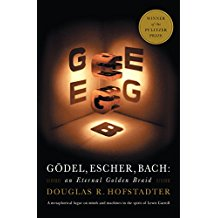
Get it on Amazon. Read my notes. Made You Think podcast episode on the book.
“ Where does your sense of having a will come from? You’ll probably say it comes from your brain, a piece of hardware you neither designed nor chose. You aren’t a “self-programmed object,” but you still do have a sense of desires and it springs from the physical substrate of your mentality.”
A monster of a book, Hofstadter manages to seamlessly combine artificial intelligence, math, art, music, genetics, entomology, Lewis Carrol style dialogues, and so much more into an epic work on the nature of consciousness and how we might think about intelligence, especially as it applies to designing machines that can think. It’s long, and very dense at parts, but he manages to be funny as well, and it’s very worth it for the payoff at the end.
The Sovereign Individual by James Dale Davidson and William Rees-Mogg
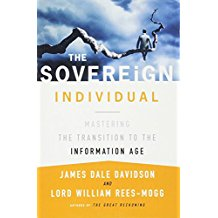
Get it on Amazon. Read my notes. Made You Think podcast episode on the book.
“In the future, wealth will be measured not just by the amount in your bank account, but in your ability to structure your affairs to realize complete individual autonomy and independence. Unprecedented financial independence will be possible for you in your lifetime.”
The next couple decades of technological advancements will give us unprecedented ability to live in ways that would have been unthinkable 30 years ago. This book outlines how tech will change the ways we live, especially relative to countries and nation states, and how we can take advantage of it. Most remarkably, it was written in 1996 and manages to pretty accurately predict much of what has happened in tech since then, including bitcoin, YouTube, Facebook, digital nomadism, and much more.
Principles by Ray Dalio
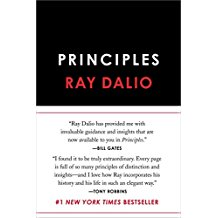
Get it on Amazon. Read my notes. Made You Think podcast episode on the book.
“ Think about how you can make all of your decisions well, in a systematic, repeatable way, and then being able to describe the process so clearly and precisely that anyone else can make the same quality decisions under the same circumstances.”
It started as a popular free PDF on the Bridgewater site, and now that Dalio has turned it into a full book, it’s even better. Principles outlines how Ray Dalio, founder of Bridgewater, one of the most successful hedge funds in the world, thinks about Life and Work. He recommends that we all create clear principles for our life that we live according to, and outlines his process for continual self improvement, dealing effectively with problems, and effectively managing a large company where the most important values are honest communication and rapid improvement.
Work Clean by Dan Charnas
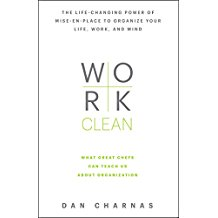
Get it on Amazon. Read my notes.
“Only one profession has developed a comprehensive philosophy on how to work, the culinary arts, and that philosophy is mise-en-place, a French phrase which means “to put in place.” In the kitchen it means to gather and arrange the ingredients and tools needed for cooking, but it’s also a tradition of focus and discipline, a method of working and being. A way of life.”
You don’t expect a book about cooking to be a productivity goldmine, but, here you go. Work Clean is an exploration of how chefs use the different elements of mise-en-place to arrange their workplaces into a hyper efficient system, and how we can all use it ourselves to better design our life.
Finite and Infinite Games by James P. Carse
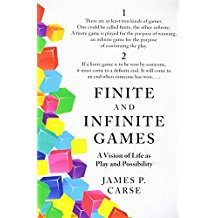
Get it on Amazon. Read my notes. Made You Think podcast episode on the book.
“The infinite player does not consume time but generates it. Because infinite play is dramatic and unscripted, its time is time lived and not time viewed. An infinite player does not begin working for the purpose of filling time with work, but for the purpose of filling work with time. Work is not an infinite player’s way of passing time, but of engendering possibility. Work is a way of moving towards a future which itself has a future.”
Most of the books on this list have introduced new mental paradigms, and this one is no different. Finite and Infinite games explains how life can be thought of on two levels: finite games, and infinite games, and how you operate as an “infinite player” is vastly different from the confining mentality of a “finite player.”
The Selfish Gene by Richard Dawkins
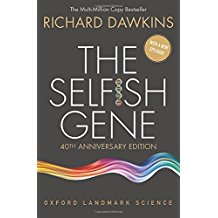
“We are survival machines-robot vehicles blindly programmed to preserve the selfish molecules known as genes. This is a truth which still fills me with astonishment. Though I have known it for years, I never seem to get fully used to it.”
The book that introduced the concept of “memes,” packets of information that spread through society through conversation just like genes spread through us via biology. It’s not a book about being selfish, as I think some people who haven’t read it believe, rather it’s about how our actions and inclinations can best be described as supporting the efforts of a genetic code that cares about nothing else beyond replicating itself. We are simply the vehicles for the genes.
The Goal by Eliyahu M. Goldratt
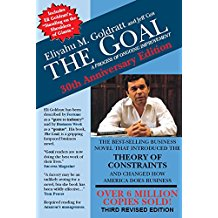
Get it on Amazon. Read my notes. Made You Think podcast episode on the book.
“ Five Focusing Steps: 1. IDENTIFY the system’s constraint. 2. Decide how to EXPLOIT the system’s constraint. 3. SUBORDINATE everything else to the above decisions. 4. ELEVATE the system’s constraint. 5. If in the previous steps a constraint has been broken, go back to step 1, but do not allow inertia to cause a system constraint.”
One of the best business books I’ve read. It’s a novel about a factory manager faced with the challenge of massively increasing his plants output in three months or else it’ll be shut down. He fortuitously meets with a master of operations, who teaches him the Theory of Constraints throughout the book, and our protagonist manages to use it to save the day. The Theory is fairly simple once you grasp it, but the book is worth reading for the stories that help illuminate it. Especially the example of a fat kid on a hike being the bottleneck.
Inner Game of Tennis by W. Timothy Gallwey
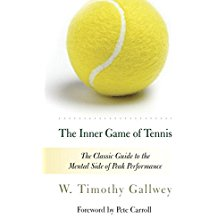
Get it on Amazon. Read my notes. Made You Think podcast episode on the book.
“Why is it so easy for a child to pick up a foreign language? Primarily because he hasn’t learned how to interfere with his own natural, untaught learning process. The Inner Game way of learning is a return toward this childlike way.”
It felt very much like Finite and Infinite Games merged with some Kahneman-esque decision science research and applied to excelling at Tennis and life. The book outlines how we have two selves: Self 1, which is conscious and tries to control what’s going on, and Self 2, which is the one who actually knows how to do things like play tennis, but is largely unconscious. We improve our performance by getting out of Self 2s way, by quieting our thinking and analyzing, and in the process, develop more Inner Game.
Pragmatic Thinking and Learning by Andy Hunt
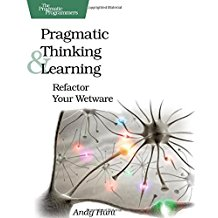
Get it on Amazon. Read my notes.
“You can’t just rely on a good teacher. A teacher doesn’t just teach, a student must also do the learning, and you must know how to learn effectively.”
A book on learning written like a programming manual. It digs deep into the learning research without all of the normal fluff that gets put in books like these, and gives an extremely practical overview of what we know about learning and expertise and how you can apply it to your own studying.
How to Lie with Statistics by Darrell Huff
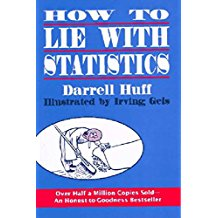
Get it on Amazon. Read my notes.
“When you hear a statistic, say, that the average American brushes their teeth 1.02 times a day, ask yourself: “How could they have figured it out?” Does it make sense that it could have been researched effectively? In this case, they would have had to ask, and don’t you think it’s a safe assumption people lied?”
A fantastic overview of how salespeople, reporters, companies, and anyone else who handles data can tweak, fudge, or flat out lie with it, and how to fight back. It’s written almost like a how-to manual to do the deception yourself, going through all the ways you can lie with statistics, and then wrapping up at the end with how to detect it and call it out. Necessary reading for today’s world where everyday you’ll run into a new bullshit statistics.
The Revolt of the Masses by José Ortega y Gasset
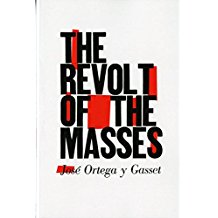
“For there is no doubt that the most radical division that it is possible to make of humanity is that which splits it into two classes of creatures: those who make great demands on themselves, piling up difficulties and duties; and those who demand nothing special of themselves, but for whom to live is to be every moment what they already are, without imposing on themselves any effort towards perfection; mere buoys that float on the waves.”
It feels like an appropriate political environment to re-read The Revolt of the Masses. Ortega y Gasset lays out the signs and symptoms of social unrest as he saw it in Spain in the early 1900s. It lays out his definition of the “mass man,” why the mass man is perpetually unhappy, and how he might be riled up into revolt against the upper class.
Enjoy! And if you want some more recommendations, you can check out the best books I read in 2016, the best books for college students, the best books for marketing, and (as of 2015) the books that had most changed my life.

